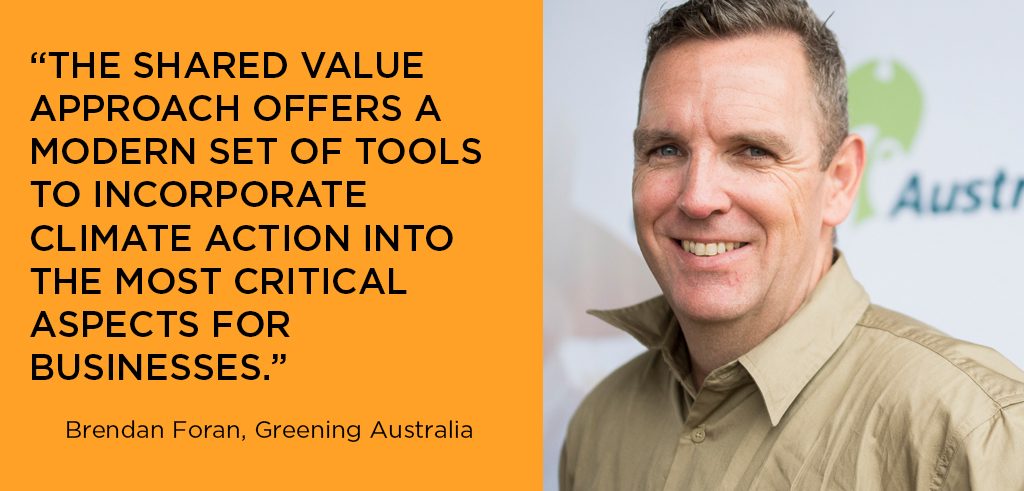Since joining Greening Australia as CEO in 2011, Brendan has led an organisation wide governance and strategy reform program that has led to greater levels of impact, efficiency and resilience. Before joining Greening Australia, Brendan was the Corporate Affairs Manager – Eastern States for Alcoa of Australia.

What does shared value mean to you?
At Greening Australia, we tackle Australia’s biggest environmental challenges with the best science and the best people in ways that work for communities, economies and nature.
It’s in our DNA is to collaborate for change, create impact and share success. At its core, shared value is a business strategy, but businesses need an NGO to partner with to create measurable social or environmental value. Therefore, I see it as an opportunity to work with our current or future business partners to return life to landscapes and restore balance to the natural environment with the potential to expand markets, increase productivity and reduce costs or risks.
What led you individually to the shared value concept? How did you come across it?
Initially it was through National Australia Bank. I attended a meeting with some of my team with the same approach I am sure many other not for profit’s take, looking for ways of partnering with a corporate through either a philanthropy or CSR lens, of course aligned to our strategic priorities, but ultimately as a way of generating revenue for our organisation to do our work on the ground.
Within this meeting, NAB introduced us to the shared value concept and explained they wanted to explore a partnership through that frame and particularly around natural capital, which has since become a project we are jointly working on with NAB.
From there, we delved more deeply into the shared value concept and not long after we came on as a not for profit member of the Shared Value Project.
Despite that recent introduction to the formal shared value concept, my shared value journey probably started a lot earlier when I was in Corporate Affairs at Alcoa of Australia from 2002-2011. Alcoa has been a renowned supporter of local community and environmental issues in their 57 years in Australia and during my time there I was involved in a range of projects that would now be considered shared value initiatives.
One such project from the mid 2000s was the outsourcing of in-house land management at Alcoa’s Point Henry site to Greening Australia (coincidentally!). There was both cost and ecological benefits at the time but what started as a leading pilot for native grassland restoration (it was previously thought to be impossible in this country) has evolved into Greening Australia being awarded $10million of funding from Infrastructure Australia to establish a native seed production area as part of the environmental approvals for the Western Sydney airport- one of the major pieces of infrastructure to be built this century.
What does shared value success look like at Greening Australia and where are you at on the journey?
We are still early on our journey with Shared Value at Greening Australia. We signed up as members in October last year and shortly after Helen Steel ran a capability workshop for management and Board members.
The opportunity for us lies in better articulating and broadening the conversations we have with corporate partners and private landholders of the commercial return and environmental benefits of undertaking large and ambitious large-scale landscape restoration projects in Australia.
Shared value success at Greening Australia would see our 150 staff understanding and using the framework to help solve some of Australia’s great environmental challenges, demonstrate proof of impact and produce inspirational stories to create influence and get more people to take action.
What is your role individually within Greening Australia to support the company along its shared value journey?
I see myself as a Shared Value ‘enabler’ within Greening Australia. For members of my leadership team, our board members and our corporate partners, the shared value framework makes sense and I understand that to achieve real scale and impact in our work, we need to create measurable business and environmental value. I am committed to exploring shared value opportunities, because at the end of the day I believe it is integral to Greening Australia’s purpose of solving challenges in which nature, communities and economies are all connected, in ways that benefit them all.
How has practicing shared value helped you individually in your role or career more generally?
It opens up dialogue with parts of organisations other than those business units we might have traditionally dealt with. In the past these conversations might have been solely with the CSR or sponsorship departments, but increasingly our partners are understanding how our work is linked back to delivering their business strategy. Whether it’s the marketing and communications team at Officeworks or the sustainability team at Virgin Australia, our partners are choosing to partner to enhance their competitiveness whilst improving the environment in the regions where they operate.
It gives me a deeper insight into our partner’s organisation and vice-versa. It’s a strong basis for two or more organisations strategies and objectives to intersect when you can better understand risk and opportunity from multiple perspectives.
What do you think are some pertinent issues in Australia that could be solved through creating shared value?
Climate change is one of the most pressing and complex challenges facing us. It is no longer an issue for the next generation and the work we specialise in helps mitigate the impacts and provides the ecological resilience our society and economy has been built on.
The shared value approach offers a modern set of tools to incorporate climate action into the most critical aspects for businesses. Businesses can create win-win situations where a notable reduction in greenhouse gas emissions can be achieved with no incremental costs, or even cost savings and perhaps financial return whilst protecting and conserving the environment from further degradation.